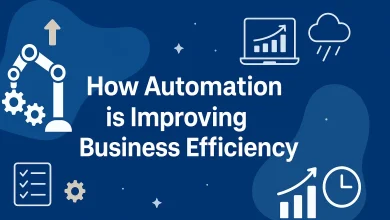How Cloud Computing is Revolutionizing Business Operations

Cloud computing has dramatically transformed business operations, offering scalable, cost-effective, and efficient solutions. Today, companies are increasingly adopting cloud computing technologies to store data, manage applications, and enhance productivity. In this article, we will explore how cloud computing is revolutionizing business operations, examining the impact on data storage, cost efficiency, remote work, security, collaboration, and overall innovation.
 |
| How Cloud Computing is Revolutionizing Business Operations |
1. Data Storage and Security Benefits of Cloud Computing for Businesses
Storing and securing business data is crucial in today’s digital age. Cloud computing offers businesses reliable storage, advanced security features, and disaster recovery options. These solutions ensure that business data remains protected, easily accessible, and secure, making cloud computing a cornerstone for modern business operations.
Key Benefits of Cloud Storage and Security for Business Operations:
- Scalable Storage: Cloud computing provides businesses with flexible and expandable data storage options that grow as data needs increase.
- Advanced Security Features: Cloud services offer robust security measures like encryption and multi-factor authentication to protect sensitive business data.
- Automated Backups: Cloud platforms automatically back up business data, reducing the risk of data loss from hardware failure.
- Disaster Recovery Solutions: Cloud computing ensures quick data recovery with built-in disaster recovery tools.
- Compliance: Many cloud providers offer services that help businesses comply with regulatory data protection requirements, enhancing security in business operations.
- Geographic Redundancy: Cloud services store business data across multiple locations, ensuring high availability, even during disruptions.
2. Cost Savings and Efficiency with Cloud Computing in Business Operations
Managing IT infrastructure is costly and often requires significant investment. Cloud computing can reduce these costs by offering pay-as-you-go pricing models, eliminating the need for expensive hardware and in-house IT teams. This cost-effective solution directly contributes to optimizing business operations.
How Cloud Computing Reduces Costs in Business Operations:
- Lower Infrastructure Costs: Cloud services eliminate the need for businesses to invest in and maintain physical servers, reducing infrastructure costs.
- Pay-as-You-Go Model: Cloud computing allows businesses to pay only for the resources they use, eliminating unnecessary expenses.
- Reduced IT Staffing Needs: With cloud platforms handling maintenance and management, businesses can reduce the size of their in-house IT teams, optimizing their workforce for other critical tasks.
- Energy Savings: Cloud data centers are more energy-efficient than traditional on-premise solutions, lowering electricity and cooling costs.
- Faster Time-to-Market: Cloud services enable businesses to deploy new products and services faster, improving time-to-market efficiency.
- Operational Flexibility: Cloud computing allows companies to allocate resources efficiently, responding to business needs more flexibly.
3. Boosting Collaboration and Productivity with Cloud Computing
The modern workforce requires effective collaboration tools to maintain high productivity levels. Cloud computing enables real-time collaboration across teams, allowing employees to share files, communicate seamlessly, and boost overall performance. This enhances the efficiency of business operations.
How Cloud Computing Enhances Collaboration in Business Operations:
- Real-Time Document Sharing: Cloud computing enables employees to collaborate on the same document at the same time, ensuring smooth teamwork and reducing delays.
- Cloud-Based Communication Tools: Platforms like Microsoft Teams and Zoom streamline communication and reduce inefficiencies in business operations.
- Task and Project Management: Cloud-based tools like Trello and Asana help businesses automate workflows, improving task management across teams.
- Version Control: Cloud-based file storage ensures that teams are always working on the most up-to-date version of a document.
- Cross-Platform Integration: Cloud solutions integrate with a variety of tools, ensuring a seamless experience across devices and software.
- Virtual Teams: Cloud computing enables businesses to build and manage distributed teams from various locations, enhancing global collaboration.
4. Scalable and Flexible Cloud Solutions for Business Operations
In today’s fast-paced business environment, companies need scalable solutions that adapt to market changes. Cloud computing offers the flexibility to scale resources up or down based on demand, enabling businesses to grow and manage fluctuating workloads efficiently, making it a critical component of business operations.
Why Scalability Matters in Business Operations with Cloud Computing:
- On-Demand Resource Allocation: Businesses can dynamically scale computing resources, such as storage or server power, according to demand, making business operations more responsive.
- Global Accessibility: Cloud platforms allow businesses to operate in multiple locations worldwide, opening up new markets without major infrastructure investment.
- Elastic Storage Management: Cloud computing automatically adjusts storage capacity based on usage patterns, ensuring efficiency.
- Business Expansion: As businesses grow, cloud services allow for expansion without requiring significant investments in physical infrastructure.
- Optimized Performance: Cloud solutions automatically adjust to maintain optimal performance during peak demand periods.
- Cost-Efficiency with Scaling: Cloud computing enables businesses to scale resources efficiently, paying only for what they need, avoiding unnecessary expenditures.
5. Supporting Remote Work with Cloud Computing for Business Operations
Remote work has become more essential, and cloud computing enables businesses to support their teams, regardless of location. With cloud computing, employees can securely access business applications, ensuring that business operations continue seamlessly even in a distributed work environment.
How Cloud Computing Facilitates Remote Work in Business Operations:
- Anytime, Anywhere Access: Cloud computing enables employees to work from any device, anywhere, ensuring consistent access to business applications and data.
- Device Compatibility: Cloud platforms are compatible with various devices such as smartphones, tablets, and laptops, making work easier for remote teams.
- Secure Remote Connectivity: Cloud services integrate encryption protocols and secure access methods to ensure that remote employees can access company resources securely.
- Unified Communication Tools: With cloud-based tools like Slack and Zoom, employees can stay connected through messaging, calls, and video meetings, improving remote work efficiency.
- Cloud-Based Applications: Employees can work seamlessly across applications without being tied to specific office environments.
- Global Talent Pool: By embracing cloud technology, businesses can hire talent from anywhere in the world, ensuring better workforce flexibility.
6. AI and Automation in Cloud Computing for Smarter Business Operations
Cloud computing is integrating artificial intelligence (AI) and automation tools, making business operations smarter and more efficient. AI and automation help businesses optimize processes, reduce manual labor, and enhance decision-making.
How AI and Automation Are Transforming Business Operations with Cloud Computing:
- Predictive Analytics: Cloud computing platforms leverage AI for data analysis, providing businesses with predictive insights to make data-driven decisions.
- Task Automation: Cloud-based AI automates repetitive tasks such as customer service, data entry, and financial reporting, streamlining business operations.
- Smart Chatbots: AI-powered chatbots provide instant customer support, helping businesses manage large volumes of inquiries without increasing operational costs.
- Personalized Customer Experiences: AI enables businesses to deliver tailored services and products, enhancing customer satisfaction and loyalty.
- AI-Enhanced Data Management: Cloud platforms utilize AI for managing, analyzing, and reporting on large datasets, improving the efficiency of business operations.
- Machine Learning Integration: Cloud computing facilitates the integration of machine learning algorithms that refine processes and enhance product recommendations.
Conclusion
Cloud computing has fundamentally reshaped business operations across industries, offering enhanced efficiency, cost savings, flexibility, and innovation. From secure data storage to real-time collaboration and AI-driven automation, the impact of cloud computing is evident. As more businesses adopt cloud technologies, they will continue to streamline operations, drive growth, and remain competitive in a rapidly evolving marketplace.



